
Rede
Speech by Federal Minister of Defence at the Bundeswehr University Munich
Erster Abschnitt des ArtikelsSpeech by Federal Minister of Defence at the Bundeswehr University Munich
The spoken word applies.
Prof. Dr Niehuss,
Members of the Extended University Management and the Senate,
Generals,
Ladies and Gentlemen,
but most of all, Students!
I am genuinely pleased, not only as defence minister, but also as someone who has been a science minister before, to be here with you today, at a very special university.
This is my first visit to the Munich Bundeswehr University – but its good reputation precedes it, which goes well beyond its research successes in the area of cyber defence.
I am standing here before the future leaders of the Bundeswehr.
Here at the university, you acquire more than just scientific know-how, more than just knowledge and ideas. You learn how to look beyond your field. You are given the best possible scientific training under special conditions – conditions that set you apart from students of other universities. This is a privilege, too, and from this arises your commitment to giving something back.
You are the ones serving our country, you are the ones filling the values of our constitution with life and standing up for security and freedom, you are the ones assuming responsibility for our future.
For this, please accept my sincere thanks. I encourage you to accept this role.
I encourage you to do more than just carry out what is required of you, to be actual leaders – and to shape the future.
This is especially true in times of upheaval and uncertainty.
Where change is tangible, but new things have not yet taken shape.
This is the impression we have these days when we look at the international situation and Germany’s role in the world.
A world that, as many people claim these days, has been thrown out of joint.
You all know the developments that are challenging our security policy:
- Russian aggression in Ukraine, in particular the annexation of Crimea in violation of international law, which is still ongoing;
- the global networks of terrorism, in particular Islamist terrorism;
- China’s rise in power politics, and its claim to power that by now extends beyond its immediate neighbours.
We are currently witnessing a return of great-power competition for spheres of influence and supremacy.
We are witnessing authoritarian challenges to our open society.
We are witnessing states evading rules of international order that have been established for decades – whether on the non-proliferation of nuclear weapons or on international trade.
And we are witnessing all this in an environment of profound change – climate change, demographic change and digital transformation are key aspects here.
While this environment is new, it is linked with traditional questions of security policy.
Let me use the example of cyberspace to illustrate my meaning:
To begin with, cyberspace is not a physical dimension and has, in itself, no geographical borders.
But it is a space created by humans, in which a multitude of political, economic, and social interests compete, including state interests. It is not an entirely virtual space either.
There are routers and data centres, data lines and satellites, all combining to make cyberspace possible.
Someone is building the hardware, programming the software, selling the applications.
All these are potential instruments for shaping cyberspace, potential means of power and influence, and not only in the digital world.
From this arise tasks for our security and defence policy – which no one knows better than you, here, at the top location of German cyber defence research.
And in keeping with academic principles, I could continue to detail and profoundly analyse these various new challenges.
But I do not want to indulge in descriptions today. Instead, I want to reflect on the overall significance that these security developments have for us, and what we can do about them.
Former US President Obama often told his staff: “Don’t admire the problem. Tell me about solutions.”
This is what citizens expect politicians to do.
This is also what the Bundeswehr can rightfully expect of its political leaders, can rightfully expect of me.
Now there is no lack of prudent analyses and strategy papers. We have never had a problem of insight. What we have difficulties with is implementation.
There is general consensus that Germany must become more active to face its strategic challenges, that we must do more in order to protect our values and interests.
This applies in particular to a security and defence policy whose mission it is to serve, by creating the conditions for progress, prosperity and freedom.
We are not sending you on deployments abroad just to be able to say ‘you are on deployment’. We are sending you there to create the conditions necessary for making civilian reconstruction and life within a humanitarian order possible again, in many crisis areas around the globe.
This is particularly true when it comes to the resolution of conflicts. Here, Germany should, as stated by former Federal President Joachim Gauck, act “earlier, more decisively and more substantially.”
These words were said at the 2014 Munich Security Conference, where the then Foreign Minister Frank-Walter Steinmeier and Ursula von der Leyen, Defence Minister at the time and my predecessor, made comments very much to the same effect.
This cross-party agreement that we refer to as ‘Munich consensus’ has also influenced the German government’s 2016 White Paper on Security Policy and the Future of the Bundeswehr. All of this has lost none of its validity and accuracy.
A country of this size and economic and technological power, a country of this geostrategic position and with these global interests, such a country cannot simply stand on the sidelines and watch.
We cannot just wait for others to act and then go along, or not go along, as we may see fit.
We must make our own suggestions, develop our own concepts, present our own options.
It is our duty as Germans, and it is very much in our own interest, to join in these international debates, to drive them forward, to play a part in protecting the international order and in promoting its effective evolution.
For we have benefitted like hardly any other country from this liberal order that was established and expanded after World War II.
An order that continues to govern our lives. It has made us what we are today. For this reason, we now have a special obligation to defend it.
We are the trading nation that depends most on international reliability.
Along with China, we are the world leaders in international container shipping – and we depend on free and peaceful shipping routes.
We are also situated at the heart of a continent that depends on secure borders and, at the same time, on active exchange – not only in economic, but also in scientific, cultural and societal terms.
This cannot be had for free. Neither here nor anywhere else.
For the longest time, others have put in most of the necessary effort, first and foremost the United States.
And while it has become quite fashionable these days to be highly critical of America, also in response to some of the measures taken by the US government, especially we Germans should never forget the part that particularly the United States have played in our development.
We should not forget the freedom and prosperity that America has brought us. And, just a few days before the 30th anniversary of the Fall of the Berlin Wall, we should not forget the things we owe the United States in this context.
Without the Berlin Airlift, without the Raisin Bombers, I am not sure that we would have survived the Berlin Blockade. Without the United States’ promise of freedom, without the solidarity of NATONorth Atlantic Treaty Organization, I am not sure we would have been able to keep going all these years.
Without this longing for freedom that came from the United States most of all, I am not sure if the desire for freedom in the Eastern European states and, ultimately, in the former East German Democratic Republic would have flared up in such a way to enable people to take to the streets and stand up against a regime, eventually bringing down walls.
Nowadays, however, both the willingness and ability to do more than its fair share are dwindling in the United States.
This is why we must step up in future, just like others who are defending a reliable, free and democratic order.
Of course, Germany is already making a considerable contribution, including in the area of security and defence. We have nothing to be embarrassed about.
We are, for example, the second largest troop-contributor to the mission in Afghanistan – and to NATONorth Atlantic Treaty Organization as a whole.
We are the only continental European nation to have taken a leading role in the enhanced Forward Presence protecting Eastern Europe.
We support partner nations such as Mali and Iraq in training their own security forces – to create a bulwark against international terrorism.
Nevertheless, our role is consistently questioned, doubts are raised again and again. If these doubts are raised, it is certainly not only because there are too few tangible results.
Because we do see progress, for instance regarding the so-called Islamic State, which was forced to withdraw from its territory – owing, among other things, to our contributions in support of Peshmerga forces. But let me add at this point: We have supported the Peshmerga by providing materiel and equipment. The fighting was done by the troops on the ground. They are the ones who have suffered casualties – not we.
But we also know that the tragic reality of international security policy is that there will always be crises, and we will never be able to counter all threats, or bring peace to every war-torn country. We are realistic in terms of what we can accomplish, and we have to be.
So why the doubts? I suspect they are rooted in something else.
Our declarations of intent and our strategic concepts are not always and not entirely consistent with what we are actually putting into practice.
We Germans are often better at declaring our good, even morally motivated intentions, placing high demands on ourselves and others, than at actually proposing measures and implementing them.
This is particularly true for our military contributions, but goes beyond them as well.
Many Germans are aware that we must assume more responsibility – that was the message of both the Munich consensus and the White Paper of the German government.
This awareness bears a promise, however, that we have not entirely fulfilled just yet.
For we understand how difficult it is to translate the right ideas into action.
We invoke our “culture of restraint”, we claim all sorts of considerations and constraints, but we have every reason to show more courage.
Not only because the strategic situation is becoming more serious, but also because our nation has an enduring tradition of democracy and the rule of law – and is deeply embedded in the transatlantic alliance and the European Union.
The time has come for us to summon from this the power and the confidence to make a greater impact on the world and on our future, together with our partners and allies.
If we have the courage to assume this active role, it will be to the benefit of us all – in Germany and beyond.
I hear calls for this coming from all sides, for example when I am looking at many titles of books published in recent months by experts on German security policy, or in my capacity as defence minister.
Whether I am traveling to Brussels or to Washington, whether I am visiting deployed soldiers in Mali or in Lithuania – everywhere I am asked:
“Can the Germans please do more?” And: “Can we really rely on you, or will you retreat back into your shell soon?”
On the one hand, this is a good sign, because it shows that our contributions are recognised and valuable, and that they are appreciated.
On the other hand it shows how far away we still are from solving these problems.
So what does it mean to “do more”? To “assume more responsibility”?
First of all, it means that Germany must develop a position regarding all questions that concern its strategic interests.
For of course Germany, like any other nation in the world, has its own strategic interests.
As a globally interconnected trading nation at the heart of Europe, for instance, we act according to our interests every day. We must finally start to admit that.
This is also why we must take action and must take the initiative, so that our positions and our interests can become a reality.
This also entails questioning the status quo of our current security policy.
The fight against terrorism in the Sahel region, for example, is mostly in the hands of our French friends – despite the fact that Germany is just as much threatened by terrorism and its consequences.
And despite the fact that our allies pursue the same objectives as the German government.
I am convinced, however, that since we share the benefits of security and stability in Europe, we should also share the burden.
This applies to material as well as moral burdens, as the President of the German Bundestag Wolfgang Schäuble put it last week in his Adenauer speech.
This ultimately also includes the willingness to employ, if necessary, the entire spectrum of military means in cooperation with our partners and allies, as we have done in Afghanistan in the fight against terrorism.
I know exactly how many of our soldiers have been killed or injured during the ISAFInternational Security Assistance Force mission.
And precisely because I know this, the importance of the contributions of our allies and partners is even clearer and dearer to me.
Which is why we should never regard this mission as a matter of course, but always as an example of true solidarity.
And solidarity can never, must never be a one-way street.
Take another example:
Our partners in the Indo-Pacific region – such as Australia, Japan and South Korea, but also India – feel increasingly encroached upon by China’s claim to power.
They would like to see a clear sign of solidarity, in support of applicable international law, inviolable territory, and free shipping routes.
The time has come for Germany to give such a sign, to be present in the region together with our allies.
Because it is in our interest that existing law be observed.
And because we can only rely on the solidarity of others if we show solidarity ourselves.
I am firmly convinced that a strong, united Europe will help us do so.
We intend to strengthen European cooperation in the field of defence, and we will.
This will be one of the priorities of our Presidency of the Council of the European Union in the second half of 2020.
All proposals strengthening Europe’s ability to act in the area of security and defence are strengthening the European pillar of NATONorth Atlantic Treaty Organization.
We have ambitious plans that we want to implement with the other EUEuropäische Union Members.
For instance, we want to provide a Strategic Compass for the Common Security and Defence Policy of the European Union.
This Compass will clearly identify the direction in which we Europeans want to go, and how to get there.
It will thus be a compass for a confident European Defence Union.
As Europe, we are strong – economically, politically, and in military terms, if we want it to be, and if we remove the obstacles in our way. If we do not, we belittle ourselves. If we do not, we will have no one to blame but ourselves if the world of the future is shaped by other systems than those on whose values we all rely, and from whose values we all benefit.
I am convinced that a strong Europe is only possible based on close French-German cooperation. I say this with conviction, and not just because I grew up on the French-German border.
This cooperation serves a common European cause, in the spirit of the Aachen Treaty, the Treaty that is built on and expands the Élysée Treaty.
The common objective, my objective, too, is a Europe that has, as the experts call it, “A2A”, the Ability to Act.
This is what is essential, not autonomy or isolation – not replacing NATONorth Atlantic Treaty Organization.
This is why the European Defence Union is always oriented towards cooperation with NATONorth Atlantic Treaty Organization, which remains the anchor of security in Europe.
We want complementarity, not competition.
This is also why in my opinion, we must find creative ways of continuing to let the United Kingdom play a role in European security, beyond its role in NATONorth Atlantic Treaty Organization.
Brexit or not, the British Isles are not just going to sail away. They will remain the immediate neighbours of the European Union. They will remain a part of our security architecture.
I therefore propose that the E3 format comprising France, the United Kingdom and Germany, which was established in dealing with the Iran situation, become a permanent fixture.
The format should be formally established at the defence minister level, and the next meeting should take place before the end of 2019.
This would create an additional link between NATONorth Atlantic Treaty Organization and the EUEuropäische Union.
This way, we will provide new impetus for our common security, both within the EUEuropäische Union and within NATONorth Atlantic Treaty Organization, for all Europeans. This way, we will strengthen our ties with the United Kingdom, even beyond Brexit.
And while we are discussing the concept of a security format:
The idea of creating a security council at national level is certainly not new. But I find the case argued recently by Wolfgang Ischinger very compelling.
We should further develop our current Federal Security Council, with its limited tasks and responsibilities, to create a body that guarantees the reliable coordination of our strategic instruments.
A body that combines everything that is needed to create a humane international order: diplomacy, military, economy and commerce, internal security and development cooperation.
For if we want to fill our comprehensive approach with life, we must organise it at the executive level.
A National Security Council like this would make our contributions to international crisis management faster and more effective.
It would also make an important contribution to our strategic culture by developing a forward-looking agenda.
And let me add the following right away:
The decision to send the Bundeswehr on missions would and will of course still depend on a mandate by the German Bundestag.
The public consultations of parliament and its clear decisions provide the deployments of our military personnel with a special democratic legitimation, a legitimation which, especially given our past, we need, which is a clear benefit. We should not relinquish this benefit, for it is an inestimable value.
I am also aware, however, that the commission that reviewed the participation rights of the Bundestag during the last legislative period has developed ideas that have not yet been given sufficient consideration, such as a simplification and acceleration of the parliamentary opinion formation process.
I think it is important that the Bundeswehr can participate in international operations in line with international law without delay, effectively preventing any doubts regarding our commitment – while preserving the rights of the Bundestag.
Whenever international missions are concerned, whether NATONorth Atlantic Treaty Organization- or UNUnited Nations-led, the parliamentary procedure could be accelerated.
This should also be possible if we want to take action in cooperation with European partners.
Bundeswehr deployments not subject to parliamentary authority are unimaginable to me, however.
National Security Council, parliamentary participation, more pragmatic European structures – these are the measure we can use to improve our “A2A”, or Germany’s ability to act in the field of security policy.
Ladies and Gentlemen,
The ability to act of the Bundeswehr is, of course, also very much my responsibility as defence minister.
While the Bundeswehr is only one of many instruments of German security policy, it is a very important one.
And we all know that the Bundeswehr has some catching up to do, especially with regard to the operational readiness of materiel and equipment.
Many initiatives have been launched in the last years, much has been done, but there is clearly room for improvement.
The first step is a reasonable increase of the defence budget. Yes, we have made up a lot of ground in the last years. And for the coming year, we have for the first time broken the barrier of 50 billion regarding the amount we have pledged to NATONorth Atlantic Treaty Organization. This is an enormous accomplishment. But it is not enough, for we need an increase to 1.5% of the GDP by 2024 and to 2% by 2031 at the latest.
Not because the American President – and not just the current one – has demanded this.
But because it is in the interest of our own security.
Some may think this is not fast enough. Others may not want to spend this much money on defence at all.
I say: with the White Paper of the German government and the Capability Profile of the Bundeswehr we have two judicious documents.
They describe exactly what tasks the Bundeswehr should expect and what it needs to accomplish them.
This is good planning, and I stand by that.
Let me be clear here: At the NATONorth Atlantic Treaty Organization summit in Wales, we did more than just agree on and pledge 2%.
To me, “Made in Germany” has always had the additional meaning of being able to rely on German promises.
We have also pledged within NATONorth Atlantic Treaty Organization that of all NATONorth Atlantic Treaty Organization capabilities made available by the member states, we Germans will contribute 10%.
And if we translate these capabilities into delivery times in terms of personnel, materiel and equipment, and if we are very realistic about how long it takes to develop and field new weapon systems, then we will need the time until 2031.
And for this reason it makes sense to achieve the 2% objective by 2031. It makes no sense to just budget money that we cannot convert into materiel and personnel.
This is why we are fighting for our way of delivering to NATONorth Atlantic Treaty Organization what we have pledged, in order to contribute to solidarity, just as we can rely on our partners to make the remaining 90% available to us as well.
This is what I told NATONorth Atlantic Treaty Organization Secretary General Jens Stoltenberg when I met him yesterday, and this is what I will tell US Secretary of State Mike Pompeo when he visits the Ministry tomorrow.
When it comes to the Bundeswehr, we should not pretend that our troops are incompetent.
Which seems to be the gist of the many malicious comments that are made.
After the large number of visits and conversations that I had during my first months in office, my experience is quite different.
The Bundeswehr has – and this is the most important thing – an abundance of resourceful personnel who serve with enthusiasm and great commitment, who continue to prove, even when conditions are difficult, that the Bundeswehr is capable of accomplishing its tasks – which they have been charged with by their government – at any time.
It is the task of the politicians to improve these conditions so that we can contribute to the resolution of international challenges more effectively, more creatively, and more courageously.
We must convince others of our ideas and inspire them to cooperate with us by our actions.
All the same, we must remain principled and pragmatic.
German security policy has never been adventurous, and this will not change. And this is a good thing, too.
But I am convinced of this:
We must have a public and more open debate about our initiatives and about the consequences of what we are doing, but also about the consequences of what we are not doing.
I am aware that this discussion that we are having here today, the suggestions that are made, will also create controversy in society.
That is a good thing, however, and it is intentional.
The Bundeswehr is not an autonomous organism that exists separately from this state and its society. You are from the centre of society, you are citizens in uniform. You shape this society and you both depend on and have a right to being supported by the approval of the citizens of our country.
If, to achieve this, we need a broader debate and we need to remember that we should not take the life that our parents have built for granted, then we should not shy away from this public debate.
We must talk more, explain more, argue more about alternative options.
We should not aim to achieve superficial consensus, but talk more about German security and defence policy, not to be able to say that we have talked about it, but to be able to do more.
As the future leaders of our Bundeswehr, this will be your task, too,
Ladies and Gentlemen.
Let us therefore start right now, with your questions and ideas.
Thank you very much!
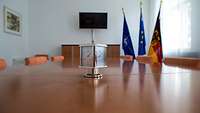

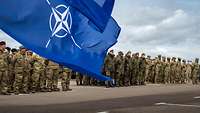
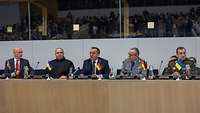
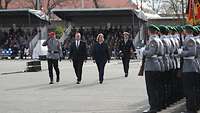


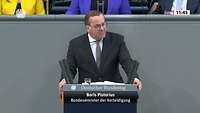
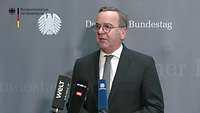
Inhalte teilen via